《Artificial Intelligence:A Modern Approach》教学资源(PPT课件,英文版)Chapter 9-Inference in first-order logic
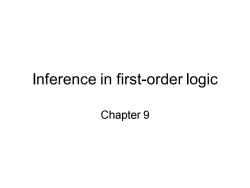
Inference in first-order logic Chapter 9
Inference in first-order logic Chapter 9
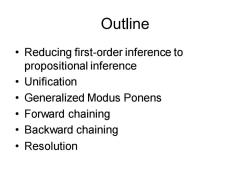
Outline Reducing first-order inference to propositional inference ·Unification Generalized Modus Ponens ·Forward chaining ·Backward chaining ·Resolution
Outline • Reducing first-order inference to propositional inference • Unification • Generalized Modus Ponens • Forward chaining • Backward chaining • Resolution
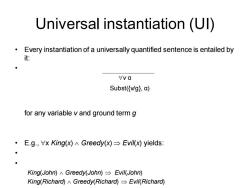
Universal instantiation (Ul) Every instantiation of a universally quantified sentence is entailed by it: ∀va Subst([v/g},a) for any variable v and ground term g ·E.g.,∀k King(x)Greedy(x)→Evil(x)yields: King(John)Greedy(John)Evil(John) King(Richard)Greedy(Richard)=Evil(Richard)
Universal instantiation (UI) • Every instantiation of a universally quantified sentence is entailed by it: • v α Subst({v/g}, α) for any variable v and ground term g • E.g., x King(x) Greedy(x) Evil(x) yields: • • King(John) Greedy(John) Evil(John) King(Richard) Greedy(Richard) Evil(Richard) King(Father(John)) Greedy(Father(John)) Evil(Father(John))
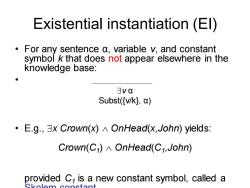
Existential instantiation (El) For any sentence a,variable v,and constant symbol k that does not appear elsewhere in the knowledge base: 3va Subst({v/k},a) E.g.,3x Crown(x)^OnHead(x,John)yields: Crown(C1)OnHead(C1,John) provided C,is a new constant symbol,called a
Existential instantiation (EI) • For any sentence α, variable v, and constant symbol k that does not appear elsewhere in the knowledge base: • v α Subst({v/k}, α) • E.g., x Crown(x) OnHead(x,John) yields: Crown(C1 ) OnHead(C1 ,John) provided C1 is a new constant symbol, called a Skolem constant
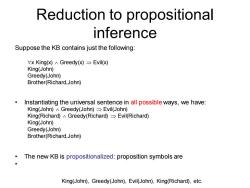
Reduction to propositional inference Suppose the KB contains just the following: Vx King(x)^Greedy(x)Evil(x) King(John) Greedy(John) Brother(Richard,John) Instantiating the universal sentence in all possible ways,we have: King(John)Greedy(John)=Evil(John) King(Richard)^Greedy(Richard)=Evil(Richard) King(John) Greedy(John) Brother(Richard,John) The new KB is propositionalized:proposition symbols are King(John),Greedy(John),Evil(John),King(Richard),etc
Reduction to propositional inference Suppose the KB contains just the following: x King(x) Greedy(x) Evil(x) King(John) Greedy(John) Brother(Richard,John) • Instantiating the universal sentence in all possible ways, we have: King(John) Greedy(John) Evil(John) King(Richard) Greedy(Richard) Evil(Richard) King(John) Greedy(John) Brother(Richard,John) • The new KB is propositionalized: proposition symbols are • King(John), Greedy(John), Evil(John), King(Richard), etc
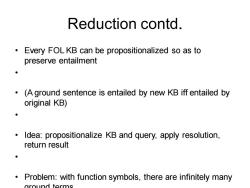
Reduction contd. Every FOL KB can be propositionalized so as to preserve entailment ● (A ground sentence is entailed by new KB iff entailed by original KB) ● Idea:propositionalize KB and query,apply resolution, return result ● Problem:with function symbols,there are infinitely many nd terms
Reduction contd. • Every FOL KB can be propositionalized so as to preserve entailment • • (A ground sentence is entailed by new KB iff entailed by original KB) • • Idea: propositionalize KB and query, apply resolution, return result • • Problem: with function symbols, there are infinitely many ground terms
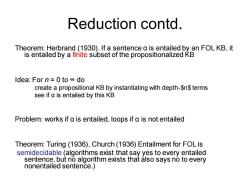
Reduction contd. Theorem:Herbrand(1930).If a sentence a is entailed by an FOL KB,it is entailed by a finite subset of the propositionalized KB ldea:Forn=0to∞do create a propositional KB by instantiating with depth-$n$terms see if a is entailed by this KB Problem:works if a is entailed,loops if a is not entailed Theorem:Turing (1936),Church(1936)Entailment for FOL is semidecidable(algorithms exist that say yes to every entailed sentence,but no algorithm exists that also says no to every nonentailed sentence.)
Reduction contd. Theorem: Herbrand (1930). If a sentence α is entailed by an FOL KB, it is entailed by a finite subset of the propositionalized KB Idea: For n = 0 to ∞ do create a propositional KB by instantiating with depth-$n$ terms see if α is entailed by this KB Problem: works if α is entailed, loops if α is not entailed Theorem: Turing (1936), Church (1936) Entailment for FOL is semidecidable (algorithms exist that say yes to every entailed sentence, but no algorithm exists that also says no to every nonentailed sentence.)
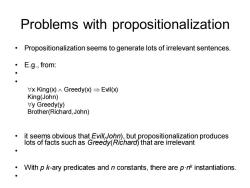
Problems with propositionalization Propositionalization seems to generate lots of irrelevant sentences. ·E.g,from: ● Vx King(x)^Greedy(x)Evil(x) King(John) Vy Greedy(y) Brother(Richard,John) it seems obvious that Evil(John),but propositionalization produces lots of facts such as Greedy(Richard)that are irrelevant With p k-ary predicates and n constants,there are pnk instantiations
Problems with propositionalization • Propositionalization seems to generate lots of irrelevant sentences. • E.g., from: • • x King(x) Greedy(x) Evil(x) King(John) y Greedy(y) Brother(Richard,John) • it seems obvious that Evil(John), but propositionalization produces lots of facts such as Greedy(Richard) that are irrelevant • • With p k-ary predicates and n constants, there are p·n k instantiations. •
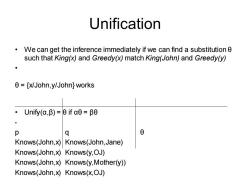
Unification We can get the inference immediately if we can find a substitution 0 such that King(x)and Greedy(x)match King(John)and Greedy(y) 0={x/John,y/John}works ·Unify(a,β)=日ifa0=B6 p q Knows(John,x)Knows(John,Jane) Knows(John,x)Knows(y,OJ) Knows(John,x)Knows(y,Mother(y)) Knows(John,x)Knows(x,OJ)
Unification • We can get the inference immediately if we can find a substitution θ such that King(x) and Greedy(x) match King(John) and Greedy(y) • θ = {x/John,y/John} works • Unify(α,β) = θ if αθ = βθ • p q θ Knows(John,x) Knows(John,Jane) Knows(John,x) Knows(y,OJ) Knows(John,x) Knows(y,Mother(y)) Knows(John,x) Knows(x,OJ)
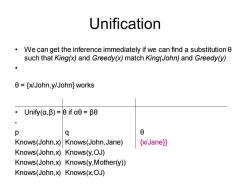
Unification We can get the inference immediately if we can find a substitution such that King(x)and Greedy(x)match King(John)and Greedy(y) 0=[x/John,y/John}works ·Unify(a,β)=日ifa0=B6 p q 0 Knows(John,x)Knows(John,Jane) [x/Jane)) Knows(John,x)Knows(y,OJ) Knows(John,x)Knows(y,Mother(y)) Knows(John,x)Knows(x,OJ)
Unification • We can get the inference immediately if we can find a substitution θ such that King(x) and Greedy(x) match King(John) and Greedy(y) • θ = {x/John,y/John} works • Unify(α,β) = θ if αθ = βθ • p q θ Knows(John,x) Knows(John,Jane) {x/Jane}} Knows(John,x) Knows(y,OJ) Knows(John,x) Knows(y,Mother(y)) Knows(John,x) Knows(x,OJ)
按次数下载不扣除下载券;
注册用户24小时内重复下载只扣除一次;
顺序:VIP每日次数-->可用次数-->下载券;
- 《Artificial Intelligence:A Modern Approach》教学资源(PPT课件,英文版)Chapter 8-First-Order Logic.ppt
- 《Artificial Intelligence:A Modern Approach》教学资源(PPT课件,英文版)Chapter 7-Logical Agents.ppt
- 《Artificial Intelligence:A Modern Approach》教学资源(PPT课件,英文版)Chapter 6-Adversarial Search.ppt
- 《Artificial Intelligence:A Modern Approach》教学资源(PPT课件,英文版)Chapter 5-Constraint Satisfaction Problems.ppt
- 《Artificial Intelligence:A Modern Approach》教学资源(PPT课件,英文版)Chapter 4-Informed search algorithms.ppt
- 《Artificial Intelligence:A Modern Approach》教学资源(PPT课件,英文版)Chapter 3-Solving problems by searching.ppt
- 《Artificial Intelligence:A Modern Approach》教学资源(PPT课件,英文版)Chapter 2-Intelligent Agents.ppt
- 《Artificial Intelligence:A Modern Approach》教学资源(PPT课件,英文版)Chapter 18-Learning from Observations.ppt
- 《Artificial Intelligence:A Modern Approach》教学资源(PPT课件,英文版)Chapter 14-Bayesian networks.ppt
- 《Artificial Intelligence:A Modern Approach》教学资源(PPT课件,英文版)Chapter 13-Uncertainty.ppt
- 《Artificial Intelligence:A Modern Approach》教学资源(PPT课件,英文版)Chapter 1-Introduction.ppt
- 《Artificial Intelligence:A Modern Approach》教学资源(讲义,英文版)chapter25.pdf
- 《Artificial Intelligence:A Modern Approach》教学资源(讲义,英文版)chapter25-6pp.pdf
- 《Artificial Intelligence:A Modern Approach》教学资源(讲义,英文版)chapter22.pdf
- 《Artificial Intelligence:A Modern Approach》教学资源(讲义,英文版)chapter22-6pp.pdf
- 《Artificial Intelligence:A Modern Approach》教学资源(讲义,英文版)chapter20b.pdf
- 《Artificial Intelligence:A Modern Approach》教学资源(讲义,英文版)chapter20b-6pp.pdf
- 《Artificial Intelligence:A Modern Approach》教学资源(讲义,英文版)chapter20a.pdf
- 《Artificial Intelligence:A Modern Approach》教学资源(讲义,英文版)chapter20a-6pp.pdf
- 《Artificial Intelligence:A Modern Approach》教学资源(讲义,英文版)chapter18.pdf
- 中国科学技术大学:《人工智能基础》课程教学资源(课件讲稿)Lecture 02 Intelligent Agents.pdf
- 中国科学技术大学:《人工智能基础》课程教学资源(课件讲稿)Lecture 03 Solving Problems by Searching.pdf
- 中国科学技术大学:《人工智能基础》课程教学资源(课件讲稿)Lecture 04 Informed Search.pdf
- 中国科学技术大学:《人工智能基础》课程教学资源(课件讲稿)Lecture 05 Constraint Satisfaction Problems.pdf
- 中国科学技术大学:《人工智能基础》课程教学资源(课件讲稿)Lecture 06 Game Playing.pdf
- 中国科学技术大学:《人工智能基础》课程教学资源(课件讲稿)Lecture 07 Logical Agents.pdf
- 中国科学技术大学:《人工智能基础》课程教学资源(课件讲稿)Lecture 10 Uncertainty and Bayesian Networks.pdf
- 中国科学技术大学:《人工智能基础》课程教学资源(课件讲稿)Lecture 11 马尔可夫决策过程.pdf
- 中国科学技术大学:《人工智能基础》课程教学资源(课件讲稿)Lecture 08 First-Order Logic and Inference in FOL.pdf
- 中国科学技术大学:《人工智能基础》课程教学资源(课件讲稿)Lecture 09 AI Planning.pdf
- 中国科学技术大学:《人工智能基础》课程教学资源(课件讲稿)Lecture 13 神经网络与深度学习.pdf
- 中国科学技术大学:《人工智能基础》课程教学资源(课件讲稿)Lecture 14 Reinforcement Learning.pdf
- 中国科学技术大学:《人工智能基础》课程教学资源(课件讲稿)Lecture 15 智能机器人系统介绍.pdf
- 中国科学技术大学:《人工智能基础》课程教学资源(课件讲稿)Lecture 01 Introdution(主讲:吉建民).pdf
- 北京大学:《信息检索》课程教学资源(PPT课件讲稿)Course Overview(主讲:闫宏飞).ppt
- 北京大学:《信息检索》课程教学资源(PPT课件讲稿)Web Search.ppt
- 北京大学:《信息检索》课程教学资源(PPT课件讲稿)Crawling the Web.ppt
- 北京大学:《信息检索》课程教学资源(PPT课件讲稿)Retrieval Models.ppt
- 北京大学:《信息检索》课程教学资源(PPT课件讲稿)Essential Background.ppt
- 哈尔滨工业大学:《信息检索》课程教学资源(课件讲义)文本分类 Text Categorization(主讲:刘挺).pdf
